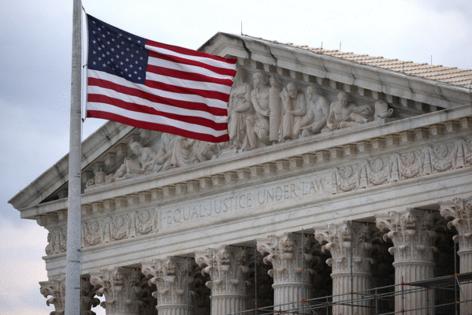Supreme Court sounds ready to revive lawsuit over ballot counting
Published in Political News
WASHINGTON — The Supreme Court appeared ready during oral arguments Wednesday to allow a challenge led by a Republican member of Congress to Illinois’ counting of ballots up to 14 days after Election Day.
Rep. Mike Bost of Illinois and Republican presidential electors want the justices to revive their case, an outcome that experts say could pave the way for challenges to similar laws in dozens of states across the country.
Bost has challenged a decision from the U.S. Court of Appeals for the 7th Circuit that tossed the lawsuit, finding that his pre-election challenge of the Illinois rule was too speculative.
During Wednesday’s oral arguments, several justices expressed concern that not allowing lawsuits from Bost or other candidates now could leave them to proceed only in high-stakes postelection challenges.
Chief Justice John G. Roberts Jr., speaking to an attorney for Illinois, said that nixing all pre-election challenges by candidates puts the court in an awkward position. Candidates would almost certainly challenge post-Election Day counting of ballots in a close race, Roberts said.
Preventing such lawsuits ahead of the election would mean any challenges to the counting are “going to be in the middle of the most fraught time for the court to get involved in electoral politics,” Roberts said.
“What you’re sketching out for us is a potential disaster,” Roberts said.
Justice Brett M. Kavanaugh expressed a similar concern about shunting disputes over ballot counts until after an election, “when we know which way we rule what the impact will be, which is never a good position.”
“I’m worried about the chaos of postelection litigation and how that would play out in a circumstance like a challenge to this particular ballot counting rule in particular,” Kavanaugh said.
The Supreme Court at this point is not considering the merits of Bost’s argument that Illinois’ law violates federal law mandating Election Day, and that it could impact his race.
Under the state law, state officials count absentee or mail-in ballots that are postmarked before or on Election Day and arrive between Election Day and the end of the period to count provisional ballots, which the challengers identify as 14 days.
Illinois has defended its law, arguing that more than half of states have had similar laws for a century or more and were originally meant to accommodate votes from soldiers in the Civil War.
Jane E. Notz, the state’s solicitor general, argued Wednesday that allowing Bost’s lawsuit to proceed could open all sorts of election rules to challenges from candidates.
Notz argued that it would still be possible for a candidate to sue over an election rule, but that Bost was arguing for a rule that would allow any candidate to sue over any election rule change.
That would “cause chaos for election officials while saddling federal courts with resolving abstract policy disputes” over election rules, Notz said.
Paul D. Clement, Bost’s attorney, argued that federal candidates in Illinois effectively must run their campaigns for an additional two weeks to monitor ballot counting in the state. Clement said the margin of victory can matter even in a safe seat.
Allowing Bost’s lawsuit “simply requires acknowledging that candidates have a unique concrete and particularized interest in the rules of the electoral road, especially those that address which ballots are going to be counted and when,” Clement said.
Similarly, the Trump administration has weighed in on the case, arguing in favor of allowing the lawsuits. Michael Talent, assistant to the solicitor general, said that without allowing the lawsuits, “the candidate is forced to gamble that the rule is not going to cost him the election.”
The attorneys for Bost and the Trump administration faced pushback from several Democratic appointees to the court. Justice Ketanji Brown Jackson said that she was concerned about the Supreme Court watering down the standard for filing a federal lawsuit, known as standing.
“It seems to me crucial to uphold this idea that harm is required for standing purposes,” Jackson said.
Jackson also expressed a concern that Bost’s logic for a pre-election challenge rule could apply after an election as well, and “we’re actually opening up avenues for a lot of postelection challenges that we wouldn’t otherwise have. People who’ve lost the election, but they want their margin of defeat to be different, or they think it might have been.”
Challenges to the counting of late-arriving ballots were part of several of the dozens of failed post-Election Day court challenges brought by President Donald Trump following his loss in the 2020 election.
Trump himself included the issue in an executive order earlier this year, asserting that he could override state laws that allow the counting of ballots that arrive after Election Day. That order has been subject to multiple court challenges and is on hold.
The case is Bost v. Illinois Board of Elections.
©2025 CQ-Roll Call, Inc., All Rights Reserved. Visit cqrollcall.com. Distributed by Tribune Content Agency, LLC.
























































Comments